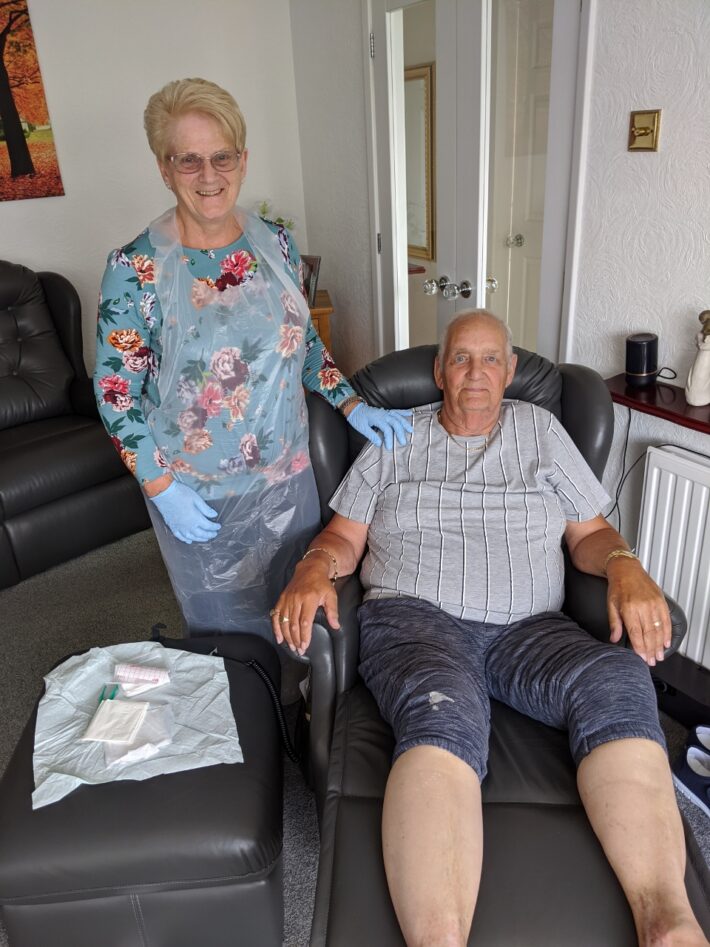Lockdown brings benefits for patients with serious leg and foot problems
- Patient waiting times fall from up to two months to five days.
- Closer working between services means problems treated 87% faster.
[i] Guest JF, Ayoub N, McIlwraith T, et al. Health economic burden that wounds impose on the National Health Service in the UK. BMJ Open 2015
[ii] Managing Chronic Oedema: A Collaborative Community Approach Melanie Lewis 1, Karen Morgan
The chair for the UK’s Legs Matter campaign says the pandemic has unexpectedly resulted in dramatic improvements to services for patients with serious leg and foot conditions – leading to an 87% fall in waiting times and a drop in the number of people who will go on to suffer disability or premature death.
Dr Leanne Atkin leads the coalition working to improve lower leg health in the UK. She claims that since lockdown, closer working with GP and other health services, coupled with supporting an estimated 500,000 lower leg and foot patients to self-care, has accelerated the long overdue redesign of services. This has enabled staff to care for double the number of patients with leg and foot ulcers, lymphoedema and other problems.

She said, “For the first time, specialist nurses have had the freedom to provide care differently, improve processes and eliminate hurdles for patients so they can get the right help faster and more easily. We are working more closely with other health care teams, including podiatrists and GP practice staff, so people with life-changing problems are picked up and treated earlier. This will result in significantly less suffering, disability and premature death.
“It used to take up to eight weeks from when someone visited their GP surgery to when they got an outpatient appointment with a specialist nurse, but that is now down to just five days. Patients who needed a vascular assessment now go through a triage system and can be seen in just an hour.
“As always, if anyone is worried about a problem with their legs or feet, it’s important that they don’t wait and they contact their GP. The NHS is still open and able to provide urgent care.”
One couple who have successfully switched to self-care are husband and wife Peter and Pat Hilton, from Temple Newsam, Leeds. Wife Pat stepped in to clean and dress Peter’s leg ulcer after he was told to self-isolate due to existing medical conditions. She was supported by Legs Matter member Kate Williams, a wound clinical nurse specialist at Leeds Community Healthcare NHS Trust.

Pat said, “At first I was nervous, but Kate has been wonderful in supporting me to care for Peter and it’s working really well. Peter’s ulcer is healing and I can always call Kate if I need support. Self-caring is more convenient for us and we also have more control over Peter’s care – if we can see something needs doing, we don’t have to wait for the next appointment.
“It’s beneficial to other patients too because it means Kate can help more people. It’s good to see that something positive has come out of the pandemic situation and I think services will change because of it. We’ve tried it and it’s working.”
The National Wound Care Strategy Programme lead Dr Una Adderley said: “While it is very encouraging to see patients and carers being willing to take on more self-care, it is important that they get the advice and support to enable them to do this safely and effectively. This will only be possible if there is enough capacity in the system to ensure that all people with a non-healing lower limb wound can first be seen quickly by a clinician with the appropriate skills and knowledge. We are working hard to make this happen.”
Since lockdown, important new self-care resources for patients, families and health care professionals have been added to the Legs Matter website to meet the growing demand for information.
The site has proved a lifeline for many suffering with a serious lower leg or foot problem, their carers and for health care professionals – with visits to the website during April and May rising from around 500 to an average of 1,500 per day.
Eight of the top 10 website pages are being accessed by patients – with reddish brown staining (hemosiderin) ranking as most popular, attracting 117,000 visitors over the past year and 24,500 during the past two months. This is followed by 10,725 people reading about tired, throbbing and painful legs. Since the website launched in April 2018, there have been 0.5 million page views.
Tragically, every two hours in England, someone loses their leg due to a non-healing wound and annually, it is estimated that more than a million people in the UK suffer from serious leg and foot conditions. An NHS England study estimates that having effective care early, reduces leg ulcer healing times from around two years to just a few months and is 10 times cheaper.
Legs Matter was formed by leading clinicians from The Tissue Viability Society, The British Lymphology Society, Accelerate CIC, The College of Podiatry, The Society of Vascular Nurses, The Lindsay Leg Club Foundation, Foot in Diabetes UK and The Leg Ulcer Forum. They want to ensure that anyone with a lower leg or foot problem understands their condition and gets the urgent care and support that they need.
For more information watch our film









